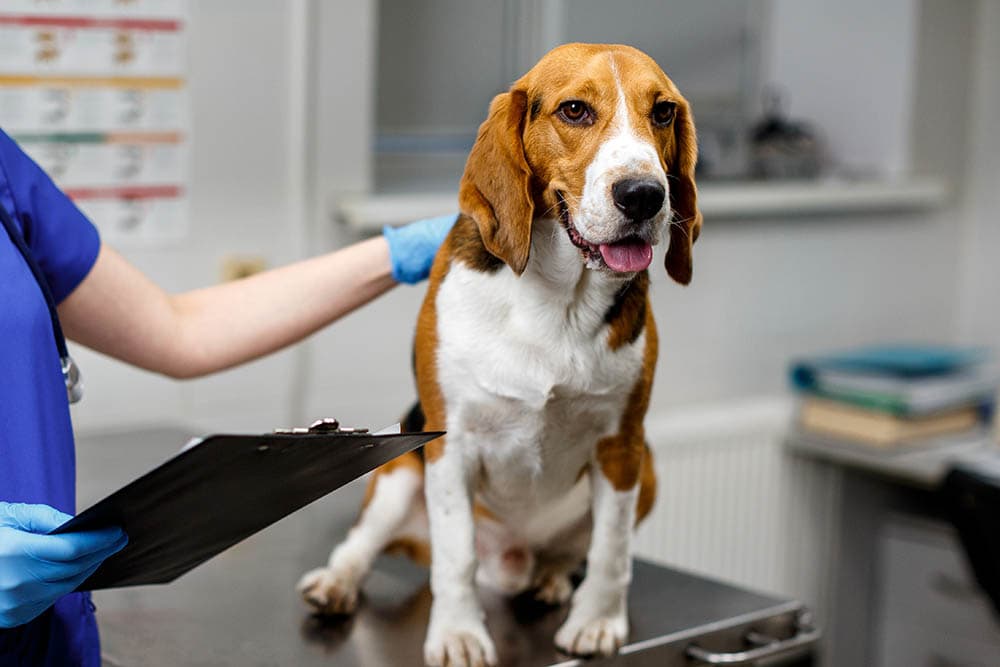If you own a small dog or want to bring one into your family, you are probably aware they are prone to different health complaints than bigger dogs. This can be a direct result of their small size or due to genetic factors. As every breed differs, you should research your dog’s breed for a more comprehensive idea of their common health conditions.
Small and large dogs can suffer from the same diseases, but this article will discuss seven diseases more prevalent in smaller breed dogs.

The 7 Small Dog Health Problems
1. Luxating Patellar

| Average Age of Onset | Puppy or young adult |
| Type of Disease | Orthopedic |
The patellar is a small bone, also called the “kneecap.” As this name suggests, the patellar is located in the knee and, under normal circumstances, sits within a groove at the end of the femur. Luxating means dislocating or slipping out of place.
Luxating patellar occurs when the patellar slips out of its special groove. This usually occurs because the conformation of the bones predisposes the patellar to slip out of place. If your dog has a luxating patellar, you might notice them hopping on three legs when the patellar is luxated. The condition can be painful and may need surgery to correct. Arthritis and other orthopedic diseases can occur secondary to luxating patellar.
2. Mitral Valve Disease
| Average Age of Onset | Middle-aged to older adult |
| Type of Disease | Cardiovascular |
The heart contains several valves, and the mitral valve sits between the left atrium and the ventricle. Mitral valve disease occurs most commonly due to age-related degeneration of the valve in smaller dog breeds. It causes the valve to “leak” when the heart is pumping, which can be heard as a heart murmur when listening with a stethoscope. Mitral valve disease can go unnoticed for several months, even years.
However, in time, your dog can develop signs like exercise intolerance or even go into congestive heart failure, which results in the build-up of fluid in the lungs, and signs like coughing, respiratory distress, and death can occur in advanced cases.
Mitral valve disease and congestive heart failure are manageable with the correct medications, which highlights the importance of regular check-ups to catch the disease early on.
3. Cushing’s Disease

| Average Age of Onset | Middle-aged to older adult |
| Type of Disease | Hormonal |
Cushing’s disease occurs when the body produces too much cortisol due to problems in the pituitary gland or adrenal glands. The excess cortisol leads to a specific set of signs, including increased appetite and thirst, urinating more, hair loss, pot-bellied appearance, panting, and lethargy.
These signs can also be mimicked if your pet is on steroid medications. However, the signs usually resolve when the medication is stopped. The disease can be treated through medication or surgery and diagnosed with special blood tests and sometimes advanced imaging.
4. Dental Disease
| Average Age of Onset | Young to middle-aged adult |
| Type of Disease | Dental |
Smaller breed dogs have the same number of teeth as larger dogs, but they are crammed into a smaller space, especially if your dog is a brachycephalic (short-faced) breed, like a Pug or French Bulldog. Plaque and tartar start to accumulate on crowded teeth.
Left unchecked, the gums become inflamed (gingivitis), and bacteria infect the area around the tooth root (periodontal disease). This can lead to pain and infections and may mean the teeth need extraction.
The good news is that dental disease is preventable with good at-home dental care. Brushing your dog’s teeth and using products approved by the Veterinary Oral Health Council (VOHC) will minimize plaque and tartar. Having said that, your dog may still require professional dental cleaning to keep their mouth healthy.
5. Intervertebral Disc Disease

| Average Age of Onset | Young to older adult |
| Type of Disease | Spinal |
There are two kinds of intervertebral disc disease (IVDD). Specifically, type 1 is typically seen in chondrodystrophic breeds with short legs and long bodies, including Dachshunds, Beagles, and Shih Tzus.
Type I IVDD occurs when a disc between the spine’s vertebrae herniates or ruptures, leading to disc material compressing the spinal cord. Signs can range from back/neck pain to weakness to complete paralysis.
In milder cases, a conservative treatment with rest and pain relief is an option. For more severe cases, surgery is necessary to restore the function of the spinal cord, and the sooner, the better.
6. Tracheal Collapse
| Average Age of Onset | Middle-aged to older adult |
| Type of Disease | Respiratory |
The trachea is the airway or “windpipe” that leads to the lungs. It is made of ligaments and cartilage rings. In tracheal collapse, the ligaments or rings become softened, leading to the airway folding in on itself like a wet paper straw.
Dogs with tracheal collapse often have a harsh, dry cough that worsens when walking with a collar. Depending on the severity, treatment can be medical or surgical. Minimizing other factors like inhaled irritants and being overweight can also help manage the condition.
7. Obesity

| Average Age of Onset | Young to older adult |
| Type of Disease | Nutritional |
Obesity is common in all dogs, but especially in small-breed dogs. Since smaller dogs have lower calorie requirements, it’s easy to overfeed them in their meals or through excessive treats. If your pet gets too many calories for their size, metabolism, and activity level, they will have a high body condition score.
You cannot easily feel their ribs, and they will not have a waist when you look down on them from above. These dogs are more prone to joint diseases, pancreatitis, and cancer. Luckily, obesity is easily treatable through calorie restriction.

Conclusion
Now that you know some common small dog health problems, you can monitor for any signs of disease. That, combined with regular veterinary check-ups, should help you pick up any problems early on, potentially avoiding a more serious, even life-threatening, situation.
Not all small dogs will have these problems, and large breeds can also be affected by every condition on this list.
Featured Image Credit: fast-stock, Shutterstock










